最新外研版高中英语必修二Module3知识详解教学内容
- 格式:doc
- 大小:37.00 KB
- 文档页数:5
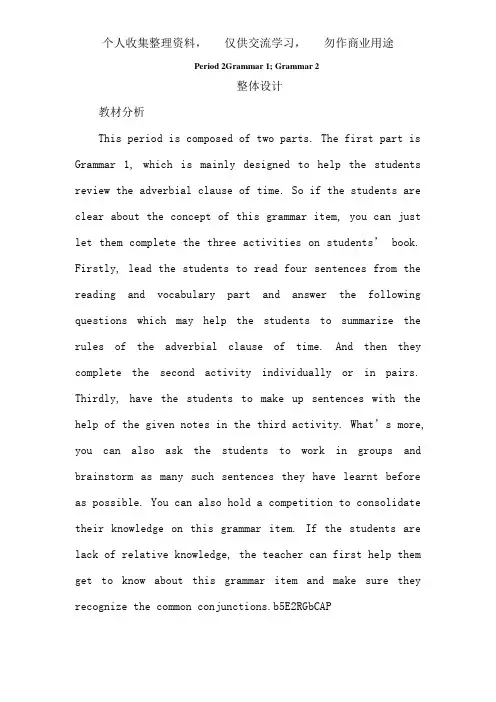
Period 2Grammar 1; Grammar 2整体设计教材分析This period is composed of two parts. The first part is Grammar 1, which is mainly designed to help the students review the adverbial clause of time. So if the students are clear about the concept of this grammar item, you can just let them complete the three activities on students’ book. Firstly, lead the students to read four sentences from the reading and vocabulary part and answer the following questions which may help the students to summarize the rules of the adverbial clause of time. And then they complete the second activity individually or in pairs. Thirdly, have the students to make up sentences with the help of the given notes in the third activity. What’s more, you can also ask the students to work in groups and brainstorm as many such sentences they have learnt before as possible. You can also hold a competition to consolidate their knowledge on this grammar item. If the students are lack of relative knowledge, the teacher can first help them get to know about this grammar item and make sure they recognize the common conjunctions.b5E2RGbCAPThe second part to be dealt with is Grammar 2. First have the students read the given sentences in activity one and find out which tenses are respectively used in the independent sentences as well as the dependent sentences. Then the students read the two pairs of sentences and answer the following questions in order to tell the differences between the simple past tense and the past perfect tense. Next, the students need to complete the third and fourth activities individually or in pairs to deepen their understanding of the uses of the simple past tense and the past perfect tense. If the class is of higher level, the teacher can design more activities for the students to practice. p1EanqFDPw三维目标1. 知识与技能1>Develop the students’ reading ability.2>Enlarge and enrich the students’ grammar knowledge.DXDiTa9E3d2. 过程与方法1>Explanations to make the students master the two grammar items.RTCrpUDGiT2>Make the students know how to make use of the adverbial clause of time as well as the past perfect tense correctly through individual or pair work.5PCzVD7HxA3. 情感与价值1>Make it fun to cooperate with others.2>Try to raise the students’ cooperative awareness in their study by pair work or group work. jLBHrnAILg 教案重点1. Learn to research by cooperation.2. Learn to make use of the adverbial clause of time as well as the past perfect tense correctly. xHAQX74J0X 教案难点1. Lead the students to take an active part in class.LDAYtRyKfE2. Make the students learn how to use the adverbial clause of time as well as the past perfect tense correctly. Zzz6ZB2Ltk教案过程→Step 1 Review and Lead-inOption 1—DictationThe teacher reads out the following and the students have a dictation.dvzfvkwMI1Words: audience, choir, classical, composer, conductor, jazz, musician, orchestra, saxophone, court, director, genius, lose, musical, peasant, symphony, talent, Austria, prince, compose, tourrqyn14ZNXIOption 2—TranslationAsk the students to translate the following sentences in the table into Chinese, using the phrases learnt last class.EmxvxOtOco1. 汤姆做作业时经常听流行音乐。

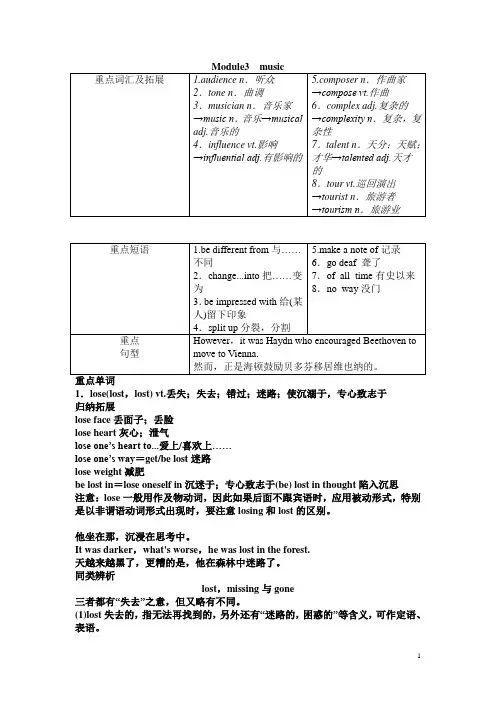
Module3 music重点词汇及拓展 1.audience n.听众2.tone n.曲调3.musician n.音乐家→music n.音乐→musicaladj.音乐的4.influence vt.影响→influential adj.有影响的poser n.作曲家→compose vt.作曲6.complex adj.复杂的→complexity n.复杂,复杂性7.talent n.天分;天赋;才华→talented adj.天才的8.tour vt.巡回演出→t ourist n.旅游者→tourism n.旅游业重点短语 1.be different from与……不同2.change...into把……变为3.be impressed with给(某人)留下印象4.split up分裂,分割5.make a note of记录6.go deaf 聋了7.of_all_time有史以来8.no_way没门重点句型However,it was Haydn who encouraged Beethoven to move to Vienna.然而,正是海顿鼓励贝多芬移居维也纳的。
重点单词1.lose(lost,lost) vt.丢失;失去;错过;迷路;使沉溺于,专心致志于归纳拓展lose face丢面子;丢脸lose heart灰心;泄气lose one’s heart to...爱上/喜欢上……lose one’s way=get/be lost迷路lose weight减肥be lost in=lose oneself in沉迷于;专心致志于(be) lost in thought陷入沉思注意:lose一般用作及物动词,因此如果后面不跟宾语时,应用被动形式,特别是以非谓语动词形式出现时,要注意losing和lost的区别。
他坐在那,沉浸在思考中。
It was darker,what's worse,he was lost in the forest.天越来越黑了,更糟的是,他在森林中迷路了。
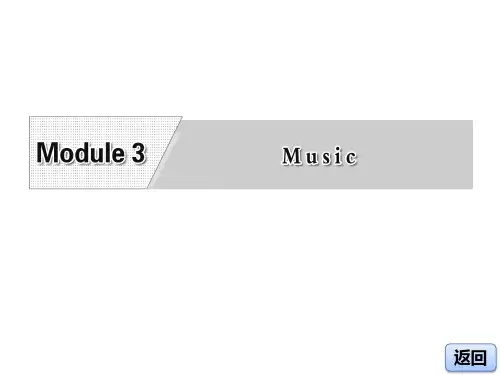
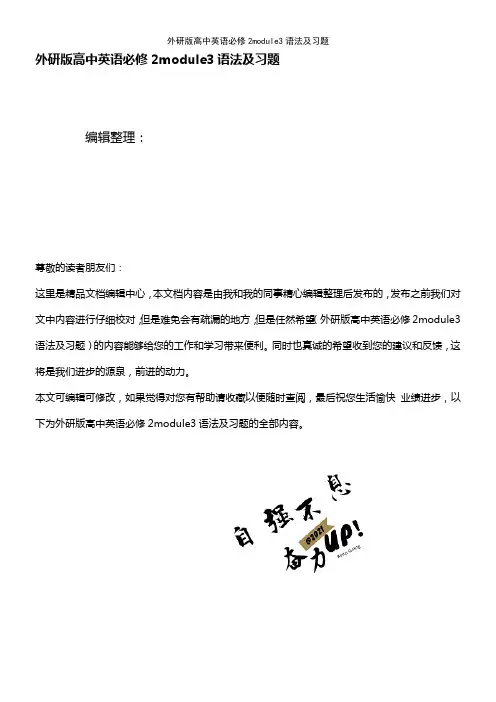
外研版高中英语必修2module3语法及习题编辑整理:尊敬的读者朋友们:这里是精品文档编辑中心,本文档内容是由我和我的同事精心编辑整理后发布的,发布之前我们对文中内容进行仔细校对,但是难免会有疏漏的地方,但是任然希望(外研版高中英语必修2module3语法及习题)的内容能够给您的工作和学习带来便利。
同时也真诚的希望收到您的建议和反馈,这将是我们进步的源泉,前进的动力。
本文可编辑可修改,如果觉得对您有帮助请收藏以便随时查阅,最后祝您生活愉快业绩进步,以下为外研版高中英语必修2module3语法及习题的全部内容。
外研版高中英语必修2 module 3 Grammar◆●■when, while和as引导的时间状语从句when, while和as都可以引导时间状语从句,意为”当……”.当从句动作和主句动作同时发生,且从句动作为延续性动词时,when, while和as都可使用。
这里我们主要讲解一下它们的用法区别:1。
when可以和延续性动词连用,也可以和短暂性动词连用,而while和as只能和延续性动词连用;when从句的谓语动作可以在主句谓语动作之前、之后或同时发生,而while和as 从句的谓语动作一般是和主句谓语动作同时发生。
如:I was washing clothes when you called me last night。
(call为短暂性动词)The journalists took notes as they listened to the report。
(listen为延续性动词)When he had found the book he took a deep breath.(found先发生)When I got to the airport my friend had already left。
(got后发生)2。
当强调伴随状态,意为"随着……;一边……一边……”时,一般用as。
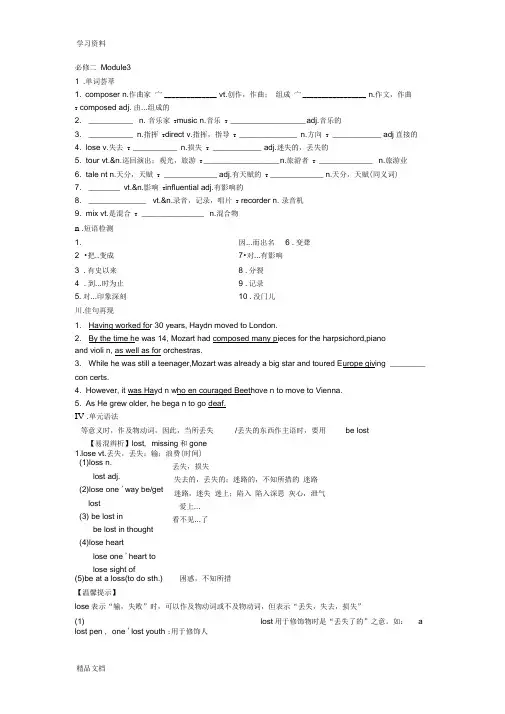
必修二 Module31 .单词荟萃1. composer n.作曲家 宀 ______________ vt.创作,作曲; 组成 宀 _________________ n.作文,作曲Tcomposed adj. 由...组成的2. __________ n. 音乐家 T music n.音乐 T _________________ a dj.音乐的3. __________ n.指挥 T direct v.指挥,指导 T _____________ n.方向 T ___________ adj 直接的4. lose v.失去 T __________ n.损失 T ___________ adj.迷失的,丢失的5. tour vt.&n.巡回演出;观光,旅游 T _________________ n .旅游者 T ____________ n.旅游业6. tale nt n.天分,天赋 T ____________ adj.有天赋的 T ____________ n.天分,天赋(同义词)7. _______ vt.&n.影响 T influential adj.有影响的8. _____________ vt.&n.录音,记录,唱片 T recorder n. 录音机 9. mix vt.是混合 T ______________ n.混合物n .短语检测1.因...而出名 6 .变聋2 •把..变成 7•对...有影响3 .有史以来 8 .分裂4 .到...时为止 9 .记录 5.对...印象深刻10 .没门儿川.佳句再现1. Having worked for 30 years, Haydn moved to London.2. By the time he was 14, Mozart had composed many pieces for the harpsichord,piano and violi n, as well as for orchestras.3. While he was still a teenager,Mozart was already a big star and toured Europe giving ________ con certs.4. However, it was Hayd n who en couraged Beethove n to move to Vienna.5. As He grew older, he bega n to go deaf.IV .单元语法1.lose vt.丢失,丢失;输;浪费(时间)(1) l oss n.lost adj.(2) l ose one 'way be/get lost (3) be lost inbe lost in thought (4) l ose heartlose one 'heart to lose sight of丢失,损失失去的,丢失的;迷路的,不知所措的 迷路 迷路,迷失 迷上;陷入 陷入深思 灰心,泄气 爱上... 看不见...了(5)be at a loss(to do sth.)困惑,不知所措【温馨提示】lose 表示“输,失败”时,可以作及物动词或不及物动词,但表示“丢失,失去,损失”(1)lost 用于修饰物时是“丢失了的”之意。
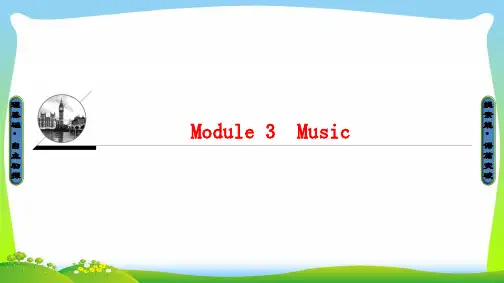


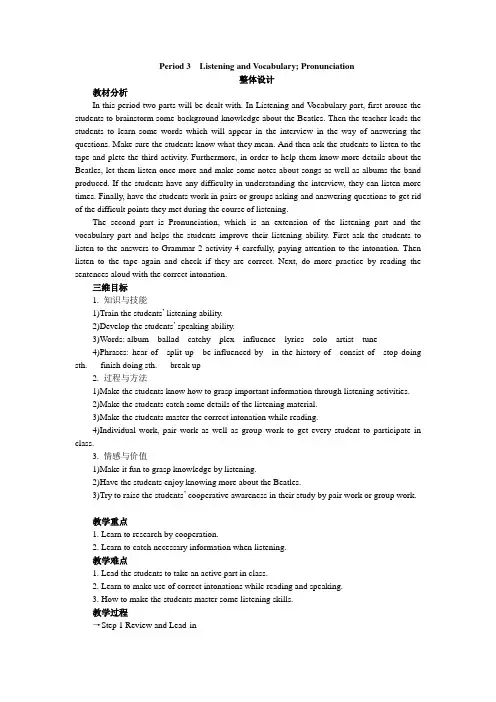
Period 3Listening and Vocabulary; Pronunciation整体设计教材分析In this period two parts will be dealt with. In Listening and V ocabulary part, first arouse the students to brainstorm some background knowledge about the Beatles. Then the teacher leads the students to learn some words which will appear in the interview in the way of answering the questions. Make sure the students know what they mean. And then ask the students to listen to the tape and plete the third activity. Furthermore, in order to help them know more details about the Beatles, let them listen once more and make some notes about songs as well as albums the band produced. If the students have any difficulty in understanding the interview, they can listen more times. Finally, have the students work in pairs or groups asking and answering questions to get rid of the difficult points they met during the course of listening.The second part is Pronunciation, which is an extension of the listening part and the vocabulary part and helps the students improve their listening ability. First ask the students to listen to the answers to Grammar 2 activity 4 carefully, paying attention to the intonation. Then listen to the tape again and check if they are correct. Next, do more practice by reading the sentences aloud with the correct intonation.三维目标1. 知识与技能1)Train the students’ listening ability.2)Develop the students’ speaking ability.3)Words: album ballad catchy plex influence lyrics solo artist tune4)Phrases: hear of split up be influenced by in the history of consist of stop doing sth. finish doing sth. break up2. 过程与方法1)Make the students know how to grasp important information through listening activities.2)Make the students catch some details of the listening material.3)Make the students master the correct intonation while reading.4)Individual work, pair work as well as group work to get every student to participate in class.3. 情感与价值1)Make it fun to grasp knowledge by listening.2)Have the students enjoy knowing more about the Beatles.3)Try to raise the students’ cooperative awareness in their study by pair work or group work.教学重点1. Learn to research by cooperation.2. Learn to catch necessary information when listening.教学难点1. Lead the students to take an active part in class.2. Learn to make use of correct intonations while reading and speaking.3. How to make the students master some listening skills.教学过程→Step 1 Review and Lead-inCheck the students’ homework by asking them to work in pairs and pare their answers. Then show the correct answers on the screen for the students to refer to. If necessary, give some explanations to help make them much clearer about some difficult points.→Step 2 Listening1. Background knowledge(Show the following questions on the screen. )1)Do you know the word “band”?2)Does the word “band”mean one person or more than one?3)Can you name some of the famous bands?4)What is your favourite band? Say why?The teacher puts the whole class into groups of four to discuss the above questions and work out the answers. Then pare their answers with other groups. Next, the students refer to the correct answers shown on the screen. Later, the teacher asks the whole class to look through and observe the above pictures. Finally, have the students brainstorm as much information about this world-famous musical band as possible with the help of the questions listed in the first activity on P26.2. VocabularyOption 1Ask the students to read the listed words as well as questions in activity two on P26 individually and try to understand what they all mean. Then ask some students to read them out and others check if they are correct. Next, let them answer the questions by themselves. If they e across any problems in their understanding, they can turn to the teacher, other students or a dictionary for help. Finally, have the students refer to the correct answers shown on the screen after they pare their answers in pairs.Option 2Hold a petition. The teacher writes any word in the table on the blackboard or shows them on the screen for the students to read. The petition rules are as follows:When a word is given, the students who know it raise their hands. The one that does this first reads the word and give its Chinese meaning or explains it in English. If he or she is correct, he or she will get five grades. Otherwise, he/she gets zero and another one can read and explain it again. Each student has only one chance to read the same word. The guy who gets the most grades will be the final winner.After they know what the words mean, the teacher reads the questions one by one while the whole class give the answers.Option 3Read the listed words out and let the students follow you. Meanwhile, make them payattention to the stress of them. Put the students into pairs to practice reading them. One reads them through, while the other checks if the words are read and stressed correctly. Then exchange their roles to repeat this.Suggested answers:1)They remember it. 4)More than one.2)The words. 5)They like them.3)Difficult. 6)No, they don’t.3. While-listening1)Option 1The teacher asks the students to listen carefully for the first time and try to catch the main idea of the record. Then, let them look through the sentences in the third activity quickly and understand their meanings pletely. Later the students listen a second time to decide whether the sentences they just read are true or false. Finally, in order to make the students confirm their answers are correct, you can let them listen once more.Suggested answers:(1)T(2)F(3)T(4)T(5)TOption 2(Show the following questions on the screen. )The Beatles were born in Liverpool in the north of England. During the early 1960s, the Beatles were1) by American rock singers. They had their first hit in 1962 with a2)song called Love Me Do. During the mid-1960s, the Beatles gave rock music a new direction. Meanwhile, they sang some serious songs, 3)as well as 4)songs. By the late 1960s, the 5)and the 6)had bee more interesting. After they had finished recording Let It Be, they 7). After the group had broken up, all the Beatles performed as 8)artists or started other bands.First the students predict what the record is mainly about. Then ask them to listen to the tape carefully to get the main idea of the record and check if their prediction is correct. Exchange their main ideas with others. Next, play the tape one more time and the students listen carefully to catch some details. Meanwhile, they need to fill in the blanks. Later the students work in pairs to pare their answers. At last the teacher shows the correct answers on the screen for the students to refer to or just call back answers from the class.Suggested answers:1)influenced2)catchy3)ballads4)plex5)tunes6)lyrics7)split up8)soloOption 3(Show the following questions on the screen. )1)Who wrote most of the songs?2)When did they have their first hit?3)When did they tour the United States?4)What was their last album?5)What did they do after the group had broken up?6)When and where did John Lennon and George Harrison separately die?The students are required to read them through and understand them. Then let them listen to the tape and find out the answers to the questions. Ask some students to report their answers to the class. Finally, check their answers according to the correct ones.Suggested answers:1)Lennon and McCartney.2)In 1962.3)In 1964 after they had bee stars in their own country.4)Let It Be.5)After the group had broken up, all the Beatles performed as solo artists or started other bands.6)John Lennon died in New York in 1980 while George Harrison died in 2001.2)First, the teacher puts the students into four big groups. Each one is required to make notes about one special songs or album mentioned in the fourth activity. Then the teacher plays the tape through one more time while the student listen carefully to catch as many details about these songs and albums as they can. Next, each group has a discussion and collects the necessary information that members got, organising them in order. Finally, the teacher asks representatives of each group to report their results to the whole class. You might as well encourage them to give different opinions.Suggested answers:Nowhere Man: seriousYesterday: balladStrawberry Fields Forever: plexLet It Be: last album.Tapescript:The Beatles were the most successful band in the history of popular music. The band consisted of John Lennon, Paul McCartney, George Harrison and Ringo Start. Starr played drums, the other three played guitar. Lennon and McCartney wrote most of the songs all the Beatles were born in Liverpool in the north of England.During the early 1960s, the Beatles were influenced by American rock singers, such as Chuck Berry and Elvis Presley. They had their first hit in 1962 with a catchy song called Love Me Do(1962). In 1964, after they had bee stars in their own country, the Beatles toured the United States and were a huge success.During the mid-1960s, the Beatles were one of the bands which gave rock music a new direction. Some of their songs were quite serious, such as Nowhere Man; there were ballads such as Yesterday and more plex songs such as Strawberry Fields Forever.By the late 1960s, their music had changed pletely. They had stopped writing simple songs with catchy tunes. The tunes and the lyrics had bee more interesting and they had begun to use new instruments, too. For example, after visiting India, they started using Indian instruments.Some of their albums changed pop music pletely. Their last album was Let It Be in 1970.After they had finished recording Let It Be, they split up. By the time they stopped working together, they had sold more albums than any other band in history. After the group had broken up, all the Beatles performed as solo artists or started other bands.John Lennon died in New York in 1980, George Harrison died in 2001.→Step 3 PronunciationFirst let the students work in pairs and read through the sentences in Grammar 2 activity 4. Meanwhile, mark when they think the voice should rise and when it should fall. Then thestudents listen to the tape and check whether their marks are correct. If not, correct them. In order to consolidate what they just learnt, ask the students to read the sentences once again and pay special attention to the intonation. Or you can choose some other sentences and have the studentsread them and mark as well as where necessary.Suggested answers:1)Unfortunately, he arrived at the show after I had left.2)By the time we arrived at the stadium, the band had begun playing.3)Fortunately, the power cut happened after the fans had left the stadium.4)Before he made his latest album, he had recorded some songs with Paul McCartney.→Step 4 Relative Language Points in This Period1. plex adj. 合成的,复杂的,综合的,难解的n. 复杂,合成物a plex sentence复合句a plex number(数)复数a plex situation错综复杂的形势a plex argument/problem/subject复杂难懂的论证/问题/科目a laboratory plex综合实验室a sports plex综合体育馆have a plex about sth. 对……过分敏感或担忧a plex of. . . 很多复杂的……There is a plex network of roads round the city.城市周围有复杂的公路。
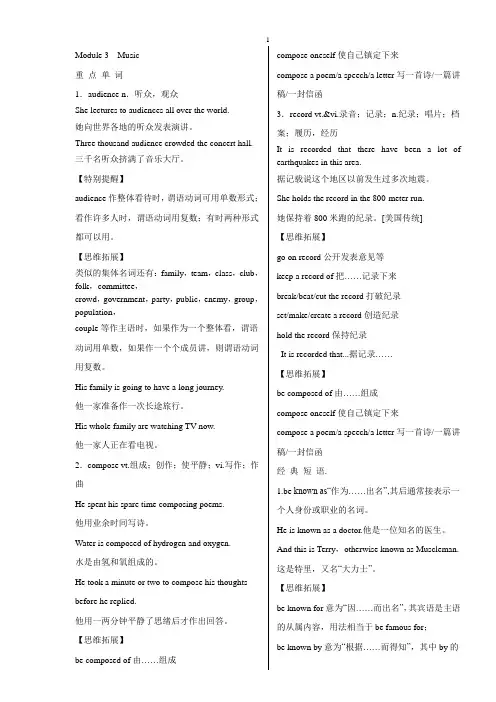
Module 3Music重点单词1.audience n.听众,观众She lectures to audiences all over the world.她向世界各地的听众发表演讲。
Three thousand audience crowded the concert hall. 三千名听众挤满了音乐大厅。
【特别提醒】audience作整体看待时,谓语动词可用单数形式;看作许多人时,谓语动词用复数;有时两种形式都可以用。
【思维拓展】类似的集体名词还有:family,team,class,club,folk,committee,crowd,government,party,public,enemy,group,population,couple等作主语时,如果作为一个整体看,谓语动词用单数,如果作一个个成员讲,则谓语动词用复数。
His family is going to have a long journey.他一家准备作一次长途旅行。
His whole family are watching TV now.他一家人正在看电视。
2.compose vt.组成;创作;使平静;vi.写作;作曲He spent his spare time composing poems.他用业余时间写诗。
Water is composed of hydrogen and oxygen.水是由氢和氧组成的。
He took a minute or two to compose his thoughts before he replied.他用一两分钟平静了思绪后才作出回答。
【思维拓展】be composed of由……组成compose oneself使自己镇定下来compose a poem/a speech/a letter写一首诗/一篇讲稿/一封信函3.record vt.&vi.录音;记录;n.纪录;唱片;档案;履历,经历It is recorded that there have been a lot of earthquakes in this area.据记载说这个地区以前发生过多次地震。
Module 3 MusicSection Ⅰ Introduction & ReadingPre-readingFolk songs are the songs that are made up by common people. Many folk songs tell about heroes, robbers or young girls. Others, like OldMacDonaldHadaFarm, are just for fun. Some folk songs are about the kinds of work that people do. Christmas carols (圣诞颂歌) are folk songs, and so are the patriotic (爱国的)songs of many countries.Every country has its own folk songs. Most of these songs were made up long ago, and people have been singing them for hundreds of years.Of course, in China, we also have a long and honoured tradition of folk songs and folk singers. Like all folk songs, they come from the ordinary people and tell of things in ordinary lives. There are three main kinds of Chinese folk songs: Hao Zi, Xiao Diao and Shan Ge.Hao Zi is sung by males. Shan Ge is sung by two people,while Xiao Diao, with its beautiful tone, is usually sung by girls.And in this module we’ll learn something interesting and important about some foreign musicians. We’ll be impressed by their special experiences and talent in music. Well, let’s begin.Section_ⅠIntroduction & Reading —Prereading[原文呈现][读文清障]Joseph Haydn(1732-1809)was an Austrian composer①and is known as②“the father of the symphony③”. Other composer s had written symphonies before Haydn, but he changed the symphony into④ a long piece for a large orchestra⑤.He was born in a village in Austria⑥, the son of a peasant⑦. He had a beautiful singing voice⑧. After studying music in Vienna⑨,Haydn went to work at the court○10 of a prince ⑪in eastern Austria, where he became director⑫ of music. Having worked there for 30 years⑬, Haydn moved to London, where he was very successful.Wolfgang Amadeus Mozart (1756-1791) was a composer, possibly the greatest musical genius⑭ of all time⑮. He only lived 35 years and he composed⑯more than 600 pieces of music.Mozart was born in Salzburg, Austria. His father Leopold was a musician⑰ and orchestra conductor⑱. Wolfgang had musical⑲talent⑳from a very early age. He learned to play the harpsichord○21 when he was four, he started composing music when he was five, and when he was six, he played the harpsichord in a concert for the Empress○22 of Austria.By the time he was 14, Mozart had①composer/kəm’pəʊzə/n.作曲家②be known as作为……而著名③symphony/’sImfəni/n.交响乐;交响曲;交响乐团④change ...into ...把……转变成……⑤orchestra/’ɔːkIstrə/n.管弦乐队(团)⑥Austria/’ɒstriə/n.奥地利⑦peasant/’peznt/n.农民the son of a peasant是he的同位语。
Module 3 musicAims and requirements●To enable the students to listen and talk about likes and dislikes(especially about music and musicians),encouraging them to trythe vocabulary and everyday English in this unit● To develop the students’ reading ability●To help the students learn and use two grammars (adverbial clauseof time and the past perfect tense) in different situations●To help the students to write a biography of a person, using thetime expressions in Grammar 1Teaching proceduresPeriod 1 Introduction,Warming up Teaching aims:Enabling the students to1.know some words about music2.know something about three great posersstep1. Warming up by listening pieces of music and asking questionsPlay several pieces of music (music from Haydn, Mozart and Beethoven will be best) to let the students listen and appreciate, then ask them:1)Do you like music?2)What about these pieces?3)What is your favorite kind of music?4)Who is your favorite musician? And who is your favorite poser?step2. Warming up by showing some pictures and discussing1)Do you know who they are?2)What kind of things are these pictures connected with, science, culture,politics, painting, drawing or music?step3. Warming up by listening to a piece of musicGoodmorning, class. Today we are going to read a passage about three great musicians who are all posers. A poser is a musician who writes pieces ofbeautiful music for others to sing or to play. Now,let ’s listen to a piece of music.(the teacher plays a piece of music ----er quan yingyue)1.do you know what kind of music it is?2.whose work is it?3.what kind of music is it?4.what is your feeling after listening to it?Step 4 show the following picturesAnd make the students familiar with these new words:Piano violin saxphone drum erhu guitarste p4.now please match these musical instruments with their names.Step 5 work in groups to discuss these questions:1.which of the instruments do you like listening to?2.which famous musicians play them?3. is the chinese instruments different from the otherinstruments?describe the difference,if there is one.Step6 summary and homework:Today we’ve learnt the Introduction,know something about music,and we’ve also learnt some new words.The homework:1.Try to instruct your favorite musician to your class orally.2.Learn the new words again, using the dictionary if necessaryPeriods 2 Reading and VocabularyTeaching Aims:Train the students' reading ability.Learn some useful words and expressions.Teaching Important Points.Help the students to understand the passage better.Learn and master some important words and phrases in this period.Teaching Difficult Points:Howto help the students improve their reading and understand the passage better.Teaching Methods:Fast reading to get the general idea of the text.Careful reading to understand the passage better.Discussion to help the students understand what they've learned better. Teaching procedure.Step 1 Lead --inThe teacher may play a kind of music written by Beethoven.------- What kind of music do you think it?----- Who do you know wrote it ?The teacher may discuss the questions and answer them freely.T:As we know, there are various kinds of music around the world. They allhave their own obvious characteristic. And also there were famous poserssuch as Joseph Haydn, Mozart, and Beethoven. Today we may learnof their life from the text.Step 2 Reading prehension.Fast reading: Read the passage quickly and choose the best title.A.Three Great Austrian posers.B.Three Great poser of the eighteenth Century.C.Three Great Child posers.Now let's read the passage again, underline new words in the text anddecide whether the following statements are right or not.1.The three posers were all born in Austria.2.Mozart had a beautiful singing voice.3.Mozart died before his fortieth birthday.4.Beethoven once worked at the court of a prince, who began to godeaf when he grew older.5. Beethoven had ever met Haydn, but he didn't think he taught him a lot.6.Both Haydn and Mozart had fathers who were musicians.Key:1. F Beethoven was born in Bonn, Germany.2. F. Haydn had a good singing voice.3.T4. F. Haydn once worked at the court of a prince, but he didn't go deaf.5.T6. F. Haydn was the son of a peasant( The teacher may begin with the T/F questions orally and this is a goodtime to test their listening abilities as well as their prehension of the text. )Step 3 Read and listen to the passage. Meanwhile, some morequestions are waiting for you.1. How did Haydn change the form of symphonies?2.How long did he work in eastern Austria?3.How many pieces of music did Mozart pose?4.How old was he when he played for the Empress of Austria?5.How long were Mozart and Haydn friends?6.Who taught Beethoven how to play the piano?7.Did he stop posing when he became deaf?1 He changed the symphony into a long piece for a large orchestra.2.30 years.3.More than 600 pieces of music.4. Whenhe was 6 , he played the harpsichord in a concert for the Empress of Austria.Periods 3, Function and GrammarTeaching aims: 1 To learn grammar rules2To use the grammar rules for correctmunication3 To study co-operatelyTeaching important points:To use the correct tense and theproper conj.Teaching difficult points: To use correctly the two tenses andthe three conj.Teaching methods:Explanation and practiceTeaching procedure:StepⅠLead-in by telling the class what happened to the ShenzhouⅫAs science and technology is developing rapidly,China hasachieved a lot in the area of.ShenzhouⅫlaunched when/whilescientists,engineers and the whole nation were waiting andwatching.When I came back home from school and heard the news,I couldn’t help getting exciteed. I feel proud of our country. StepⅡ Grammar 11 Make sentences with“when , while, e in , have a lesson”( Here is a picture of a classroom and a student ing in)A When he came in, we were having a lesson.B When we were having a lesson, he came in.C While we were having a lesson, he came in.2 Say the meaning of“as” in the following sentences.D As he was a child, he studied drawing.E As he grew older, he began to go deaf.F He listened to music as he walked.当⋯之跟着一⋯一⋯3Answer the three questions.When we talk about a single event in the past,we use when asin A .Whenwe talk about a period of time in the past,we use when/ while/ as as in B C D.We use as to refer to a progressive change as in E F .4Practiceplete the following sentences with“when ,while , as ”(1)___she was studying at school, she also sang in theschool choir.(2)___he was living in Vienna, he studied music.(3)___she met bach,she was only 20 years old.(4)___he grew older, he found it more difficult to pose music(5)___he was playing in the orchestra, he met his wife.(6)___he was working in Hollywood, he became ill and died.(7) ___I listened to the violin solo, I fell in love withclassical music.(8)___they toured Europe for 10 years, they finnallydecided to live in Austrilia.1 Read the following sentences and summarise rules,paying attention to tenses. Fill in the blanks.After Liping had finished doing his homework, he turned on the TV.After they had got everything ready, they began to do the experiment.Before he came to our school, he had taught English for several years.Before his letter reached me, I had received his telephone call.They had finished the project by last month.I had left the country by the time the letter reached me.had done before diddid after had donehad done by did/past time2 PracticeWorkbook Grammar (2)(3)(4)plete the sentences using the verbs in brackets and the pastsimple or past perfect tense.Step Ⅳ1 Game Oral practice ,pair work.Ask and answer questions using all kinds of tenses.Example:-- When did you have your breakfast this morning?--At 6.--Have you prepared for the English lesson?--Yes, I have. I have finished the exercises in the workbook.2 Watch a vedio play.Step Ⅴ Sum upAsk some students to make sentences using“when, while, as, before, after, by” .Step Ⅵ Homework: Present a biography of a famous Chinese musician orposer.Periods 4 Speaking and WritingTeaching Aims:1.Knowledge and Skilla.To develop speaking ability by talking about likes and dislikes.b.To learn about some vocabulary and knowledge related to musicand posers.c.To develop writing ability by presenting a biography of afamous Chinese musician or poser.d.Train the ability of collecting and dealing with information, andand develop their abilities of getting new information, municationcooperation.a. To raise students ’ interests in science and form the right attitude towards allkinds of music.b. To help them know Chinese traditional music well and cultivate theirinterest in playing some Chinese instrument.3.Character-building:a. To make them know how to enjoy different kinds of music.b. Arouse their interest of playing some kinds of instrument and enrich theirleisure time.4.Cross-cultural awarenessa. To help them know the difference between China and some westerncountries in instruments.b. Cultivate their awareness of cultural munication through the special language—music.a. To make the students understand and grasp the vocabulary and knowledgerelated to music.b.To enable the students to know how to use adverbial clause of time. Teaching Method:a.Task-based methodologyb.municative ApproachTeaching Procedures:Step 1 Pre-readingLook at the picture and answer the following questions.1.Who is he?2.Have you ever know something about him?Step 2 While-readinga. SkimmingRead the passage quickly, and make a note of some basic information about Ye xiaogang .NameSexNationalityJobMain achievementStyle of musicSuggested answers:Name Ye xiaogangSex MaleNationality ChinaJob poserMain achievement received many prizes, home andabroadStyle of music mixing Chinese musicaltraditions with western formsand instrumentation.b. Detailed readingRead the passage carefully and fill in the blanks with proper words. Find what Ye Xiaogang did or what happened to him in the following years:Time What he did1955From 1978 to 1983198519861996Suggested answers:Time What he did1955bornFrom 1978 to 1983studied at the Central Conservatory ofMusic of China.1985held a concert of symphonies inBeijing.1986his album appeared1996played with Italian musician EnricoRava at the Beijing International JazzFestive .Step 3. Post-readingDiscussion.1. Are there any similarities between Ye Xiaogang and the European posers youhave read about in this module?2.Do you think it is a good idea to mix Chinese and western music?Step 4 Everyday Englisha. Listen to two people talking about the way they listen to musicand answer the questions.1.How do they listen to it?2.Are they happy with the way they listen to music?3.What does Anna offer to do for Tom?b. work in pairs. Discuss your favourite music and how you listen to it.Step 4 Guided writingWrite a short passage of a famous singer in China— Han Hong.The following words may help you:1. sing well successful song writer2.born in1971in Tibet(西藏 )3. young watch her mother sing and dance4. at the age of nine professional(专业的 )training in Beijing.5. in 1985 her first national prize6. write songs in 19937. song Hometown number one in ChinaHomework:1. Finish writing the biography of Han Hong—a famous Chinese singer.2. Finish other exercises in this module.Periods 5 culture cornerTeaching aims :Enabling the students to1.to know sth about Ye Xiaogang2.write a biography of a famous Chinese musician or poser.Teaching steps:I.Ask some students to say something about Mozart. Give as many details as possible.II. Try to think of a Chinese musician or poser, eg. Xu Peidong. Gather these materials.1.when, where and in what kind of family he/ she was born.2.how he/ she spent his/ her childhood or youth.3.about his/ her education4.what are his/ her famous works5.what his/ her style is / wasGroup work. Ask the students to discuss about the musician or poser.Then ask somestudents to stand up to say sth. about the musician or poser. Correct the mistakes if any.III. Cultural Corner.Ye Xiaogang1.Listen to the passage and try to find the answer to this question:When did his album Horizon appear? (in 1986)2.Read the passage thoroughly and make a note of the informationabout Ye Xiaogang.Name:_________________ Sex: __________________Nationality:_____________ Job:___________________Main achievements: ____________________________________________ Style of music: ____________________________What he did or happened to him in the following years:1955: ___________________________________________From 1978 to 1983: ___________________________________________ 1985: ___________________________________________1986: ___________________________________________1996: ___________________________________________3. Check the answers with the whole class. Then ask one or two students to say sth about Ye Xiaogang with the help of the notes made.nguage points:1) work as2) leading modern posers主要作曲家leading article社论the leading cause主要原由a leading role主角3) mix A with B=mix A and B togethermix win with waterNever mix with such people.mix up弄混,弄错It’s mon to mix him up with his brother.弄乱mix up the papersmix up those data4)receive many prizes5)part ofIV. Homework:Write a short passage about the Chinese musician or poser we talked about this period.。
必修二Module3Ⅰ. 单词荟萃1. composer n.作曲家→vt.创作,作曲;组成→n.作文,作曲→composed adj.由...组成的2. n. 音乐家→music n.音乐→adj.音乐的3. n.指挥→direct v.指挥,指导→n.方向→adj直接的4. lose v.失去→n.损失→adj.迷失的,丢失的5. tour vt.&n.巡回演出;观光,旅游→n.旅游者→n.旅游业6. talent n.天分,天赋→adj.有天赋的→n.天分,天赋(同义词)7. vt.&n.影响→influential adj.有影响的8. vt.&n.录音,记录,唱片→recorder n.录音机9. mix vt.是混合→n.混合物Ⅱ.短语检测1.因...而出名6.变聋2.把..变成7.对...有影响3.有史以来8.分裂4.到...时为止9.记录5.对...印象深刻10.没门儿Ⅲ.佳句再现1.Having worked for 30 years, Haydn moved to London.2.By the time he was 14, Mozart had composed many pieces for the harpsichord,piano and violin, as well as for orchestras.3.While he was still a teenager,Mozart was already a big star and toured Europe giving concerts.4.However, it was Haydn who encouraged Beethoven to move to Vienna.5.As He grew older, he began to go deaf.Ⅳ.单元语法1.lose vt. 丢失,丢失;输;浪费(时间)(1)loss n. 丢失,损失lost adj. 失去的,丢失的;迷路的,不知所措的(2)lose one’s way 迷路be/get lost 迷路,迷失(3) be lost in 迷上;陷入be lost in thought 陷入深思(4)lose heart 灰心,泄气lose one’s heart to 爱上...lose sight of 看不见...了(5)be at a loss(to do sth.) 困惑,不知所措【温馨提示】lose表示“输,失败”时,可以作及物动词或不及物动词,但表示“丢失,失去,损失”等意义时,作及物动词,因此,当所丢失/丢失的东西作主语时,要用be lost【易混辨析】lost,missing和gone(1)lost用于修饰物时是“丢失了的”之意。
如:a lost pen,one’s lost youth;用于修饰人时是“迷茫的,不知所措的”。
如:We would be lost without your help.(2)missing 有“失踪的,行踪不明的”之意,因此“小孩失踪”应用missing。
修饰物时,意为“缺少的,不在的”如:There is a page missing from this book.(3)gone 意为“(人)离开了;(物品等)用光的,没了”;还可以指“一去不复返的”等。
如:He is gone. / All his money is gone.【活学活用】(1)He didn’t find his cell phone until he got home.直到回到家,他才发现自己的手机丢了(2)He by lee than 100 votes.他以相差不到100票输了(3)I’m what to do next. 我不知道下一步怎么办(4) ,he almost ran into the car in front of him.由于想得太出神了,他几乎撞上他前面的汽车(5)The girl was found by the river at last.失踪的女孩最后在河边被找到了(6)When he turned back, his father was already .当他转过身来时,父亲已经走了2.encourage vt.鼓励;怂恿(1)encouraging adj. 令人鼓舞的encouragement n. 鼓励;怂恿;支持courage n. 勇气(2)encourage sb. to do sth. 鼓励某人做某事【活学活用】用courage,encourage或encouragement填空(1)We should a man to work better.(2)The soldier showed great in the battle.(3)Students should be given more instead of criticism.3.mix v.混合;参合;融合(1)mixture n. 混合物,结合体mixed adj. 混合的,混杂的(2)mix up 使混淆;弄混;弄乱mix.. with... 把...和...混合,结合mix with 与..交往,与...混合【活学活用】(1)We can sometimes .我们有时能把工作和娱乐结合起来(2)Charlie doesn’t the other children.查理和其他孩子相处不是很融洽(3)I always with his brother.They look so much alike.我总是把他个他哥哥弄混,他们长得太像了4.record vt.&n.录音;记录keep a record of 把...记录下来;记下...set(up)/break/hold arecord 创造/打破/保持记录make a record 录制唱片【活学活用】(1)At the sports meeting he the record for the hundred meter race, whichfor five years.运动会上他打破了百米赛跑纪录,这一纪录已经被保持了五年(2)You should all your expenses during your trip.你应该记下你一路上所有开支Ⅴ.短语学习1.be known as 以...知名;被认为是;称为make oneself known to sb. 向某人做自我介绍make sth. known to sb. 把某事向某人公布【易混辨析】be known as, be known for, be known to 和be known by(1)be known as... 意为“作为...而出名”,as后面的宾语与主语是同位关系(2)be known for...意为“因...而出名”,for后面的宾语是主语的从属内容,可理解为原因(3)be known to...意为“被...所熟知”,to的宾语常常是人(4)be known by...意为“根据...而得知”,by的宾语是表示认识手段或判断标准的名词【活学活用】(1)The African lion is the king of the forest. 非洲狮被称为森林之王(2)This place is nationally its melons and fruits,especially its seedless grapes.这个地方因瓜果,尤其是无核葡萄而驰名全国(3)It is everyone that theory comes from practice.理论源于实践,人人皆知(4)A person is the company he keeps.可以由某人所交的朋友来判断他的为人Ⅵ.句型学习1.Having worked there for 30 years,Haydn moved to London, where he was very successful.【句式点拨】本句中having worked there for 30 years 是现在分词的完成时,在句中作实践状语,相当于时间状语从句after he had worked...。
现在分词的完成时表示的动作发生在谓语动词表示的动作之前,而现在分词一般时表示的动作与谓语动词表示的动作同时发生。
如:①Having worked there for 30 years,Haydn moved to London.②Feeling awkward, he didn’t know what to say.【易错警示】现在分词完成时的否定词not要放在having之前,而不能受现在完成时(谓语动词的时态)的影响放在后面。
如:Not having finished his work, he had to work extra hours at night. 【活学活用】(1) he was right, he tried his best to get support from his father.知道自己是对的,他尽一切努力想要得到父亲的支持(2) in the city for 10 years, he got tired of the noisy life.在这个城市居住了十年,他已经厌倦了喧闹的生活2.By the tie he was 14, Mozart had composed many pieces for the harpsichord, piano and violin, as well as for orchestra.【句型公式】表示“到...时为止,已经...”by the time + 从句(过去时)+主句(主句用by the end/age of +表过去的时间名词过去完成时)by the time + 从句(一般现在时)+主句(主句用by the end/age of +表将来的时间名词将来完成时)【温馨提示】如果by the time+从句或be the end/aged of+...的结构中所表示的时间是将来的,则主句要用将来完成时By the end of next month, he will have taught in this school for 20 years. 【活学活用】用所给词的适当形式填空(1) By the age of 17, he (become)famous as an actor.(2) By the time he was ten years old, he (complete)university.(3) By the end of next year,another new gymnasium (build) in my hometown.3.However, it was Haydn who encouraged Beethoven to move to Vienna.【句式分析】强调句型。